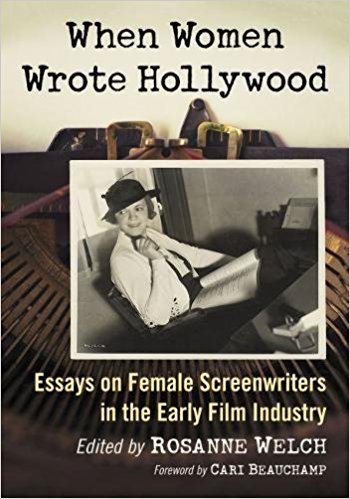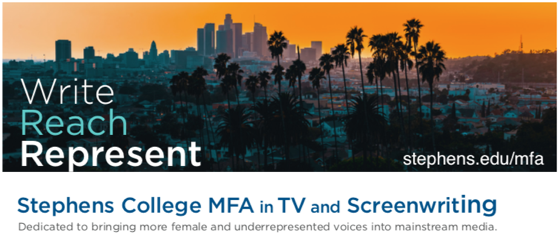Watch this entire presentation
Subscribe to Rosanne’s Channel and receive notice of each new video!
Transcript:
Thank you all very much. I apologize that I will speak in English because we do very bad in teaching languages in the United States. So this is the best that I can do, but I appreciate very much the translator who will help us all this evening. So thank you all for coming. We are here to talk about why researching screenwriters is important and I think it’s a very important thing. I’ve been teaching it for a while and I was, in fact, a screenwriter myself for a while. As a writer in Hollywood, I wrote for these television shows. You can see me in the little corner picture there quite a few years ago on “Touched by an Angel”, “Beverly Hills 90210”. These are the kind of programs from the United States that get traveled around the world and I teach my students now how important it is that they are finally being able to take in the stories from other countries and we’ll talk about the importance of streaming media and how that has allowed for that to happen as we move on.
A Note About This Presentation
A clip from my keynote speech at the 10th Screenwriters´(hi)Stories Seminar for the interdisciplinary Graduation Program in “Education, Art, and History of Culture”, in Mackenzie Presbyterian University, at São Paulo, SP, Brazil, focused on the topic “Why Researching Screenwriters (has Always) Mattered.” I was especially pleased with the passion these young scholars have toward screenwriting and it’s importance in transmitting culture across the man-made borders of our world.
To understand the world we have to understand its stories and to understand the world’s stories we must understand the world’s storytellers. A century ago and longer those people would have been the novelists of any particular country but since the invention of film, the storytellers who reach the most people with their ideas and their lessons have been the screenwriters. My teaching philosophy is that: Words matter, Writers matter, and Women writers matte, r so women writers are my focus because they have been the far less researched and yet they are over half the population. We cannot tell the stories of the people until we know what stories the mothers have passed down to their children. Those are the stories that last. Now is the time to research screenwriters of all cultures and the stories they tell because people are finally recognizing the work of writers and appreciating how their favorite stories took shape on the page long before they were cast, or filmed, or edited. But also because streaming services make the stories of many cultures now available to a much wider world than ever before.
Many thanks to Glaucia Davino for the invitation.
* A portion of each sale from Amazon.com directly supports our blogs
** Many of these books may be available from your local library. Check it out!
† Available from the LA Public Library
Podcast: Play in new window | Download
Subscribe: RSS
![01 Introduction from Why Researching Screenwriters (has Always) Mattered – Dr. Rosanne Welch [Video] (1 minute)](https://rosannewelch.com/wp-content/uploads/2020/03/rmw-sao-paolo-01.png)
![02 Women and Horror Writing from When Women Write Horror with Dr. Rosanne Welch [Video] (45 seconds)](https://rosannewelch.com/wp-content/uploads/2020/03/rmw-cpp-horror-02.jpeg)
![44 Conclusion from “When Women Wrote Hollywood” – Dr. Rosanne Welch [Video] (39 seconds)](https://rosannewelch.com/wp-content/uploads/2020/03/csuf-rmw-w3h-44.jpeg)




![01 Introduction from When Women Write Horror with Dr. Rosanne Welch [Video] (1 minute 18 seconds)](https://rosannewelch.com/wp-content/uploads/2020/03/rmw-cpp-horror-01.jpeg)

![40 Conclusion from The Sisterhood of Science Fiction – Dr. Rosanne Welch [Video] (1 minute 42 seconds)](https://rosannewelch.com/wp-content/uploads/2020/02/scifi-rmw-cpp-40.jpeg)
![39 Buffy The Vampire Slayer from The Sisterhood of Science Fiction – Dr. Rosanne Welch [Video] (48 seconds)](https://rosannewelch.com/wp-content/uploads/2020/02/scifi-rmw-cpp-39.jpeg)
![26 A New Album 50 Years Later from “Why The Monkees Matter: Even 50 Years Later [Video] (1 minute)](https://rosannewelch.com/wp-content/uploads/2020/02/monkees-popcon-2019-26.jpeg)


![38 Russell T Davies and Doctor Who from The Sisterhood of Science Fiction – Dr. Rosanne Welch [Video] (57 seconds)](https://rosannewelch.com/wp-content/uploads/2020/02/scifi-rmw-cpp-38.jpeg)